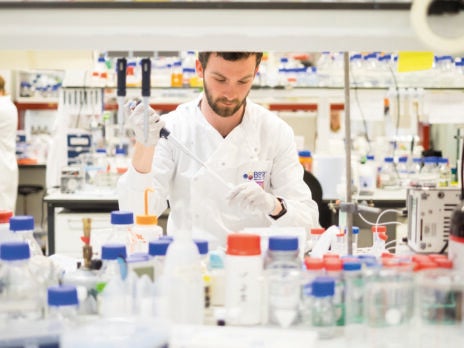If You Have Done Alpha Can You Do It Again?
It's 7.30pm on a Tuesday evening and I'm at a small-scale church in East London. A man called Adam* hands me a name label, pours me a plastic cup of squash and says dinner won't exist long. I pull upwardly a seat and introduce myself to ten strangers. It'southward all rather awkward.
The reason I'yard at church isn't because I'm religious (I'chiliad not) or because my refrigerator is empty (it is). It's because I've signed up to Blastoff, a weekly course run by churches all over the earth in order to spread the Christian message. Although I'grand an atheist, I don't take a problem with people who subscribe to religion. I am, nonetheless, wary of brainwashing, I think most religious beliefs are kind of stupid and I strongly doubtable that organised faith is a horrible thing. But, ii.viii million people in the UK have done an Blastoff class, and I'm willing to be proved wrong.
Over the next six weeks, I'll exchange Bible reading tips with experts, share stories nigh intimate prayers with total strangers and spend a lot of time crying downwardly the phone to my mum.
Simply it all begins when Adam hands me a hot canis familiaris. I don't drop mine on the flooring, different 4 of the other people, who I suppose are nervous or something. For pudding, nosotros get a box of chocolates. In week one, they're Roses. The strawberry ones get offset, which makes me suspicious considering they're the worst ones.
Adam, the course leader, is wearing a Superdry shirt. Afterward dinner, he explains that it's customary to sing. Rebecca plays the acoustic guitar and Adam mans the PowerPoint presentation, which would accept got an A* if it was a piece of ICT GCSE coursework considering the lyrics make noises when they appear on the screen.
After singing comes talking. Specifically, Adam talking. Over the next six weeks, his talks will cover: "Is there more than to life than this?"; "Who is Jesus and why did he dice?"; "How can we have faith?"; "How can we read the Bible?"; "Why and how do I pray"; and "What about the Church building?". Subsequently each talk, we'll break off into groups and talk over what we've learnt.
Content from our partners



The first couple of sessions are similar. They involve Adam handing out copies of the Bible and saying things like, "Then let'due south assume Jesus does exist and came to Globe to salve united states of america…" I'1000 genuinely the only person who is annoyed that Adam makes no attempt to prove Jesus's beingness.
Adam'south big points in the kickoff two weeks are that we should love Jesus because he loves usa in spite of our trend to sin and that nosotros should endeavor to emulate his behaviour, because it's prissy to have a role model.
Word time isn't fruitful. Natalie asks me how I'm able to distinguish between moral and immoral behaviour if I don't base of operations my deportment on Jesus' example. I explicate that I work out what makes my peers happy and try to do those things. Everyone laughs, which I discover confusing because I'm not joking. I hold that having a role model tin be helpful, only ask how they know Jesus is the best one. Anna and Will, who are married, tell me that information technology's because the Bible said so. Merely how exercise they know the Bible is right? "No offence, Tabatha," replies Louise, "simply the Bible is quite far-fetched. I don't get why someone would have made that stuff upward if it weren't true." It sounds like I'm lying, but I'chiliad not.
***
By week three, things intensify. Over dinner, we talk generally about Adam's wedlock. Information technology strikes me as odd that these people are willing, after only ii weeks of knowing each other, to share intimate stories. I wonder whether they're lone.
This week, Adam's main indicate is that Christianity isn't about rules. Fine, only there'south still no endeavour to prove God'south existence.
During discussion time, Natalie tells u.s.a. that God forgives everything equally long equally you repent. Adultery? Yes. Murder? Yes. Mass genocide? Aye. The Christians are bored of my questions and Alasdair says, "Wouldn't y'all forgive your child if he committed mass genocide, Tabatha?" I tell him it's a poor case because there's non an obvious answer, he tells me I'm too young to understand and I tell him he's patronising.
Then we talk about which bits of the Bible nosotros should take literally. Louise tells me I'll work it out if I read the Bible. I tell her I've read it. She says I will never develop a full understanding because I'thou not God so I can't sympathise everything. This is becoming a recurring theme. These people accept answers to some issues, merely as shortly every bit they hit a brick wall they settle for not agreement God and refuse to think through alternatives. They can explicate why God is forgiving (it's because Jesus took our sins), but they can't explain what taking our sins entailed, or why a perfect creator put sin in the world in the beginning place.
On my way out, I overhear Patrick, a socially awkward fellow member of the group, telling Adam that he suffers from anxiety attacks. I feel bad for making fun of him in my head, and also deplorable that Adam, a stranger who is not qualified to talk almost anxiety, is the only person Patrick feels he can turn to. I weep a bit when I get habitation.
Past week four, I find myself looking frontwards to Tuesday evening, which I didn't expect. This calendar week, Leslie, a priest from the church, speaks about evolution, which has to exist our most interesting topic to appointment. "How do I know evolution isn't true?" he begins, continuing: "Because God revealed himself to me through scripture." This annoys me: these people keep saying really obscure things and not explaining them. Leslie explains that scripture is "God-breathed," then when yous read the Bible, God is speaking directly to y'all. I'm non an idiot but I have absolutely no conception of what that means.
Leslie goes on to offering practical Bible-reading advice: y'all should read information technology for fifteen minutes a day and inquire God questions past verbalising your thoughts. By this phase, I'm bellyaching. I want to know why nosotros should read the Bible, how they know information technology'southward true, what God sounds like and how He chooses which prayers to listen to. Instead, Leslie says things like, "If nosotros pray, we become trees. Trees grow fruit, so nosotros will live fruitful lives." This kind of obscure, metaphorical conversation is driving me mad.
In word time, it becomes articulate that although these people are interested in organized religion, they're uncritical of it. Information technology's really starting to bother me that this establishment encourages blind faith at the expense of scientific enquiry. "Wouldn't it be cool if God spoke to someone we knew," Alasdair muses, and anybody nods in understanding. Well, quite. I don't get it. I don't sympathize why these people don't ask skillful questions and why they dedicate then much of their lives to something they don't seem to fully understand. I call my mum on the way abode and cry again. Blastoff'due south starting to brand me distressing.
***
Week five is all almost prayer, and I'yard dreading information technology. These people love sharing uncomfortable truths, but I discover information technology all very awkward. During dinner, I notice that everyone else on this grade is already a Christian. Rebecca runs an Alpha course for kids, Maya is hither with her brother Matteo considering the last Alpha course she did was and then helpful and Anna has bought her hubby Will because they want to explore their current faith. With so many course repeaters, I'grand starting to question the 2.8 1000000 statistic I read on the website.
Adam tells a story about his wedding ring. It's a more than elaborate version of this: Adam went to Costa. He left his wedding ceremony ring behind. He realised what he'd done. He said a quick prayer. He went back to Costa. He constitute his band. He reckons God answered his prayer. No 1 asks why God was so busy looking for Adam'south ring instead of sorting out problems like poverty.
The next affair Adam says makes me feel intensely uncomfortable. Richard isn't at Alpha today, because his begetter died of cancer concluding night. Adam explains that despite his prayers and his commitment to Christianity (which he implies puts him college up God'southward priority list), he died. "We don't know why, but God had a plan for him. It was correct that he died," Adam says. I've always had problems with organised religion, which suppresses freedom of idea and causes things like war, merely I didn't remember small-scale faith caused any impairment. It's things like this, though – people like Adam telling people like Richard that it's a good thing that his dad died of a terminal illness – that make me doubt that. In my mind, that's a wicked affair to say.
In discussion time, we're asked to talk about prayers that have been answered. I'm the only person who has never prayed. Louise claims that God in one case answered her prayer to get her to the airport on time. Alasdair thinks God stopped a wave breaking on him when he went surfing as a teenager. Robin tells us that God warned him to wear a helmet when he snowboards. But the weirdest and almost upsetting merits comes from Maya, who asked God to permit her leave her job. A week afterwards, she fell pregnant and saw that equally a sign that she should exit. She miscarried her child. Three days afterwards, the visitor she worked for closed. "I idea God gave me a child, but He actually closed down my company," she said. "He answered my prayer, but not how I expected."
"Anyone experience unconvinced by the ability of prayer?" Natalie asks. "Yes," I feel similar shouting. "YOU'RE IDIOTS. ALL OF THOSE THINGS WERE PROBABLY COINCIDENCES THAT Y'all'RE READING TOO MUCH INTO." But I can't say anything because how tin can you say those things to a group of people who have shared intimate facts about miscarriages and are now crying?
Natalie ends the session by asking u.s.a. to shut our eyes and say a prayer. You tin can opt out, and I practice. Maya asks God to reveal himself to the group's not-believers (which is basically merely me). I think I hate this.
***
Past week six, I'm relieved it's over. Alpha has been emotional, frustrating and intensely pitiful. I'm wearied. Thankfully this session does answer some of my questions. Information technology doesn't prove God's existence, but I do finally understand why people keep going back.
Adam's talk today isn't about the Bible or God or any of the other issues he forgot to tackle. It's an extended spoken communication about why you should join the church. His respond? Considering y'all'll make friends there. "We take socials in one case a week," he explains. The term "social" made me cringe at academy, and it'due south fifty-fifty worse to hear a grown man use it. Merely every bit I expect around the room, I realise everyone's happy. Patrick, who has suffered from anxiety attacks for 30 years, has found a group of people who accept him. Maya and her blood brother Matteo have a reason to hang out every week, and Jackie has gained a social life outside of her work.
"If you're a Christian, yous're our friend," Adam says. Why can't you lot detect friends outside of the church? You tin, only you won't be as close because you don't share a belief. I'm non convinced these people know what they believe because I don't think they've thought almost it properly. But what I do know is that I'one thousand sitting in a room of happy people, and although this Alpha matter may non be for me, it is for them. They're happy because they've got new friends and I'm happy because I didn't get brainwashed. Everyone'southward a winner.
*Names have been changed to protect individuals' identities
Source: https://www.newstatesman.com/politics/2013/06/inside-alpha-atheists-foray-christianity
0 Response to "If You Have Done Alpha Can You Do It Again?"
Post a Comment